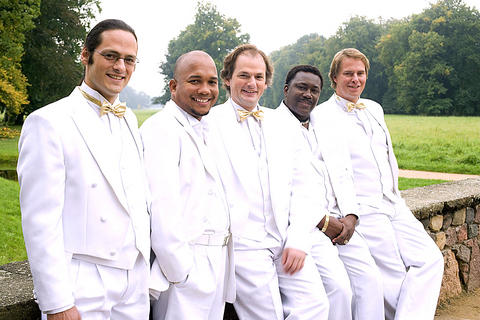The world lost one of the great popularizers of opera Sept. 6 with the death of Luciano Pavarotti. Like the full-bodied tenor, the Klazz Brothers have marketed classical music to a broad audience.
It all started in Havana, Cuba, when a trio of classically trained musicians from Germany was in town with the Dresden Orchestra and happened upon two Cuban percussionists. After a few moment's conversation they realized they shared a curious common musical ground. That meeting spawned a blend of European classical elements mixed with swing and Latin jazz and the diversity of Cuban rhythms.
The Klass Brothers and Cuban Percussion are in town for a one-off concert tonight at the National Concert Hall, where they will team up with the National Symphony Orchestra (NSO) - led by Roger Epple - to play a number of songs that fuse classical and Latin music. Featured songs include Carmen Cuban, Summertime and Mambozard.

PHOTO: COOOURTESY OF NTCH
The ensemble will then take its Cuban and classical fusion to Taichung tomorrow for a free concert at the Fulfillment Amphitheatre (圓滿戶外劇場), in Hsinwen Forest Park.
The Klazz Brothers are made up of bassist Kilian Forster, pianist Tobias Forster, and drummer Tim Hahn and Cuban Percussion comprises the talented Alexis Herrera Estevez and Elio Rodriguez Luis.

The primaries for this year’s nine-in-one local elections in November began early in this election cycle, starting last autumn. The local press has been full of tales of intrigue, betrayal, infighting and drama going back to the summer of 2024. This is not widely covered in the English-language press, and the nine-in-one elections are not well understood. The nine-in-one elections refer to the nine levels of local governments that go to the ballot, from the neighborhood and village borough chief level on up to the city mayor and county commissioner level. The main focus is on the 22 special municipality

The People’s Republic of China (PRC) invaded Vietnam in 1979, following a year of increasingly tense relations between the two states. Beijing viewed Vietnam’s close relations with Soviet Russia as a threat. One of the pretexts it used was the alleged mistreatment of the ethnic Chinese in Vietnam. Tension between the ethnic Chinese and governments in Vietnam had been ongoing for decades. The French used to play off the Vietnamese against the Chinese as a divide-and-rule strategy. The Saigon government in 1956 compelled all Vietnam-born Chinese to adopt Vietnamese citizenship. It also banned them from 11 trades they had previously

Jan. 12 to Jan. 18 At the start of an Indigenous heritage tour of Beitou District (北投) in Taipei, I was handed a sheet of paper titled Ritual Song for the Various Peoples of Tamsui (淡水各社祭祀歌). The lyrics were in Chinese with no literal meaning, accompanied by romanized pronunciation that sounded closer to Hoklo (commonly known as Taiwanese) than any Indigenous language. The translation explained that the song offered food and drink to one’s ancestors and wished for a bountiful harvest and deer hunting season. The program moved through sites related to the Ketagalan, a collective term for the

As devices from toys to cars get smarter, gadget makers are grappling with a shortage of memory needed for them to work. Dwindling supplies and soaring costs of Dynamic Random Access Memory (DRAM) that provides space for computers, smartphones and game consoles to run applications or multitask was a hot topic behind the scenes at the annual gadget extravaganza in Las Vegas. Once cheap and plentiful, DRAM — along with memory chips to simply store data — are in short supply because of the demand spikes from AI in everything from data centers to wearable devices. Samsung Electronics last week put out word